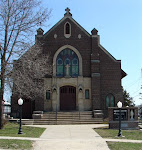Articles recommended by Father Pisut.
Anglicans expect exodus after Church of England OKs women bishops
By Simon Caldwell
Catholic News Service
LONDON (CNS) -- The largest Anglo-Catholic group in the Church of England is expecting an exodus of thousands of Anglicans to Catholicism after a decision to ordain women as bishops without sufficient concessions to traditionalists.
Stephen Parkinson, director of Forward in Faith -- a group that has about 10,000 members, including more than 1,000 clergy -- told Catholic News Service in a July 13 telephone interview that a large number of Anglo-Catholics are considering conversion to the Catholic faith.
His comments came after the General Synod, the national assembly of the Church of England, voted at a meeting in York to approve the creation of women bishops by 2014 without meeting the demands of objectors.
A July 12 statement from Forward in Faith advised members against hasty action, saying now was "not the time for precipitate action."
"This draft measure does nothing for us at all," said Parkinson. "We explained very carefully why we could not accept women bishops theologically.
"We explained what would enable us to stay in the Church of England, but the General Synod has decided to get rid of us by giving us a provision that does not meet our needs," he said. "They are saying either put up or shut up and accept innovations, however unscriptural or heretical, or get out."
For the rest of the article click here: Catholic News Service
Filipino Archbishop really seems to understand Pope Benedict
Our friends at Rorate found an extended piece fromUCANews (you might remember the liturgical opinions of its editor). You will want to read this whole thing, but here it is with my emphases and comments:
The liturgical renewal I would like to see
By Archbishop Jesus Dosado of Ozamis
Looking back, some of the culprits for me for thegradual loss of the true reform of the liturgy were the so-called “liturgists” who were more liketechnicians and choreographers rather than pure students of liturgy. [OORAH!]
They had a peculiar affinity for refined liturgical celebrations coupled with disdain for the old rites and devotions. Unfortunately, some bishops, not pure students of liturgy either, gave in to their terrorist proclivities. [I must say it is refreshing, from a bishop.]
A search for creativity and community were dominant projects in “reform-minded” Catholic circles in the 1960s and beyond. In itself, this might not have been bad. But the philosophy that the community was god, and that “God” was not fully “God” without the community was the source of ideas that have done most damage to the Church.
This secular notion of community made its way into the liturgy to gradually supplant the inherited Christian tradition.
These self-appointed arbiters of the reform were, and I hate to say this, liturgical hijackers who deprived ordinary parishioners – and bewildered pastors – of their right to the normative worship of their own Church. Hence, there was the need for a reform of the reform.
[Tell me if this doesn't sound familiar...] A major goal of Pope Benedict XVI is the restoration of our Catholic identity. Liturgy is a key component of such an endeavor.
Benedict’s broad liturgical approach can be described in terms of “continuity,” i.e. recovering elements of the liturgical tradition which he believes were too hastily set aside or downplayed in the immediate period after the Second Vatican Council.
A relevant section: “I am convinced that the crisis in the Church that we are experiencing today is to a large extent due to the disintegration of the liturgy … in that it is a matter of indifference whether or not God exists and whether or not he speaks to us and hears us. … Such circumstances will inexorably result in a disintegration. This is why we need a new Liturgical Movement, which will call to life the real heritage of the Second Vatican Council.”
[This is good...] Pope Benedict XVI in his Pastoral Letter to Catholics in Ireland situated the sexual abuse of children in the wake of fast-paced social change and a decline in adherence to traditional devotional and sacramental practices. [Change the way we pray, you change what we believe.] To his priests in the Diocese of Rome he said, “In the Eucharist we do not invent something, but we enter into a reality that precedes us, more than that, which embraces heaven and earth and, hence, also the past, the future and the present. … Hence, the liturgical prescriptions dictated by the Church are not external things, but express concretely the reality of the revelation of the body and blood of Christ and thus the prayer reveals the faith according to the ancient principle ‘lex orandi – lex credendi.’” (“the law of praying establishes the law of believing.”)


